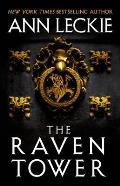Mawat is the heir to the Raven's Lease, raised with the self-assurance, determination, stubbornness, and certainty of one who will become the interface between his people and their god. Thankfully, he also has some good sense. One sign of that good sense is Eolo, his servant and companion: thoughtful, careful, curious, guarded, and well-accustomed to keeping secrets and private counsel. Eolo is the window through which the reader sees the city-state of Vastai, confident and certain in its divine protection and its long-standing bargain with the god Raven.
Raven manifests in the Instrument, a designated raven who can speak and give advice to the ruler of Vastai, the Raven's Lease. The Lease cannot be harmed, cannot be killed, because they are a sacrifice to the Raven. When the Instrument dies, so does the Lease, and a new Lease is chosen as the new Instrument is hatched. Vastai and the kingdom of Iraden have flourished under this arrangement for centuries. Mawat, hot-headed and sure of himself, will be the next Lease once his father sacrifices his life to the Raven. As this book opens, Mawat and Eolo are hurrying back to the city in anticipation of that event.
Mawat is very surprised when he arrives in Vastai and finds the Instrument dead, his uncle the apparent new Raven's Lease, and his father supposedly fled but not properly dead as the expected sacrifice. This is not how the world was supposed to work. Either someone is lying, or things have gone horribly wrong.
In another fantasy novel, that would be the story. Hot-headed but good-hearted Mawat walks into unexpected political intrigue, and his loyal and cautious servant Eolo untangles it for him, proving that Mawat's one redeeming feature is his good choice in friends. This is not that book, because the protagonist of The Raven Tower is not actually Eolo.
The protagonist is a large rock.
This is the second work I've read recently, after N.K. Jemisin's Broken Earth trilogy, that uses a second-person narrator as a world-building hint. From the start of The Raven Tower, Eolo is addressed as "you" and observed and commented on by the narrator. The easy initial assumption is that the narrator is the Raven, but if so there's a drastic mismatch between how the people of Iraden see their god and how the narrator describes events. The reader learns more about the nature of the narrator only slowly, through flashbacks into the far past. It becomes clear quickly that the narrator is a god, a being whose every statement must either be true, become true, or lead to their death. What god, and how the narrator relates to Raven, Eolo, Mawat, or the city of Vastai, remains murky until the very end of the book.
I think this story is going to wrong-foot some readers. It starts in the form of a fantasy political intrigue involving lines of succession made more complicated by divinity and magic, but that's not what The Raven Tower is about at all. The flashbacks are less background than the heart of the story: a slow and careful examination of the nature of power and the relationship between humans and gods in this world. If your reaction to the antics of the gods of classical mythology is bafflement at why they risk so much and involve themselves in so much drama, this might be the book for you.
I'm not sure I can do better than Light's comment in her review (spoilers in the comments): "I fuckin' love that rock." In a world full of gods who meddle and support kingdoms and go to wars, the narrator of this novel much prefers to watch and analyze and take time to draw proper conclusions. They're also prone to deciding to think about something for a week or two. This is a relentlessly self-aware and introspective book in a way that I found soothing and oddly compelling, particularly once the narrator rock makes friends largely by accident and has to work through the unexpected feelings of emotional entanglement. (My favorite supporting character in this book by far is Myriad, and it takes some doing to get me to fall in love with a mosquito swarm.) It turns into a story about restraint, careful navigation of dangerous situations, oppression, historical injustice, and a very long game.
The downside is that Eolo's story gets somewhat sidelined. The ending is going to be unsatisfying for a lot of readers since the surface story doesn't get a lot of closure. I liked Eolo for a whole host of reasons and wanted more of an end to their story than I got. (I'm using "they" for pronouns by default here. Eolo is trans and passing as male, but it's unclear to me from the story whether they identify as male or non-binary.) Eolo and Mawat provide an important outside perspective, and ground the longer story and make it more immediate, but they're present here more to provide key pieces of the puzzle than to drive the story themselves.
That caveat aside, I really enjoyed this book. It's less immediately engaging and emotionally engrossing than the Imperial Radch novels, but it's a story that slowly grew on me and will stick with me for a long time. There's something deeply relatable in how the narrator relentlessly examines their interactions with the world, and what makes them happy, sad, and interested, and still arrives at conclusions that are a messy combination of logic and emotion because that's what is actually true. The story is beautifully constructed to show that change over time. It's full of tradeoffs and limitations and partial truths, and it lets them sit there on the page and be felt rather than resolving all of them. It's the sort of novel that gets better the more I think about it.
Be warned going in that you're not getting the medieval court drama with gods that you may think you're getting, but otherwise, highly recommended.
Reviewed: 2019-05-25
